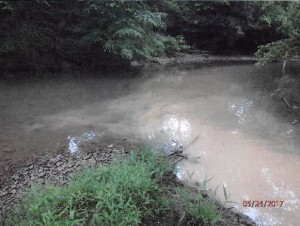From Autumn Crowe, West Virginia Rivers Coalition, December 4, 2017
This month WVDEP is holding public hearings on two major natural gas pipelines, the Mountain XPress Pipeline and the Atlantic Coast Pipeline. Each public hearing focuses on stormwater and sediment control permits, which regulate runoff from oil and gas development. Check out our guide to stormwater permits to learn more.
Mountaineer XPress Pipeline Public Hearings – December 11 & 12
The Mountaineer XPress Pipeline (MXP) would stretch 170-miles across West Virginia as part of the Columbia Pipeline Group, which spans multiple states.
Monday, December 11, 6-8pm
Doddridge County Park
1252 Snowbird Road
West Union, WV 26456
Tuesday, December 12, 6-8pm
Ripley High School
2 School Street
Ripley, WV 25271
Written comments will be accepted through Friday, December 22, 2017.
Atlantic Coast Pipeline Public Hearings – December 18 & 21
The Atlantic Coast Pipeline (ACP) would span 3 states in it’s 600-mile path, approximately 100 of those miles in West Virginia.
Monday, December 18, 6-8pm
Buckhannon Upshur High School
270 Bu Drive
Buckhannon, WV 26201
Thursday, December 21, 6-8pm
Pocahontas County High School
271 Warrior Way
Dunmore, WV 24934
Written comments will be accepted through Sunday, December 31, 2017.
Don’t wait to the last minute!
>>>>>>>>>>>>>>>>>>>>>>>>>
New consultant report on pipeline economics and manufacturing jobs
By Amy Mall, National Research Defense Council, December 4, 2017
A new expert report commissioned by NRDC concludes that there is no support for claims that a new natural gas pipeline will save consumers money, is needed to meet new natural gas demand, or will lead to additional opportunities for new manufacturing jobs. This report focuses on ACP due to the information available on the proposed end uses, but offers some cautionary relevancy for MVP:
https://www.nrdc.org/experts/amy-mall/pipe-dreams-economic-jobs-myths-natural-gas-pipelines
Other relevant blog posts:
https://www.nrdc.org/experts/amy-mall/virginia-deq-wrong-pipelines-contaminate-clean-water
https://www.nrdc.org/experts/amy-mall/pipelines-ruin-farmland-across-country
https://www.nrdc.org/experts/amy-mall/virginia-water-board-can-and-should-deny-pipeline-permits-0
https://www.nrdc.org/experts/amy-mall/top-ten-concerns-mountain-valley-atlantic-coast-pipelines
Thank you for all you do to help out!
AMY MALL, Senior Policy Analyst
NATURAL RESOURCES DEFENSE COUNCIL
1152 15TH STREET NW, SUITE 300
WASHINGTON, DC 20005


{ 1 comment… read it below or add one }
Pipeline Leaks 42,000 Gallons Into Indiana Stream
From an Article by Olivia Rosane, EcoWatch.com, March 23, 2018
Forty-two thousand gallons of diesel spilled from a Marathon Petroleum Corporation pipeline into Big Creek in Posey Creek, Indiana before the leak was detected Tuesday evening, U.S. News & World Report reported Wednesday.
The pipeline was immediately shut off, and workers contained the spill with two booms before it reached the Wabash River. Kevin Turner, the on-the-scene coordinator for the U.S. Environmental Protection Agency (EPA), told The Indianapolis Star that it was “considered a large spill.”
Fortunately, Turner told The Star that he did not think the spill would impact wildlife. No fish deaths have yet been reported, and it is too early in the year for migratory songbirds to have arrived, he said.
The spill traveled four miles before it was stopped by the booms. “If the product had made it to the Wabash, then we would not be able to collect any of it,” Turner told The Star.
Marathon was moving the fuel from its refinery in Robinson, Illinois to its terminal on the Ohio River in Mount Vernon, Indiana. Turner told The Star that efforts were now underway to recover the fuel, a process that should take about a week. He expected 60 percent of the diesel to be skimmed.
According to The Star, this is not the first time that a Marathon pipeline has leaked. In April 2016, 48,300 gallons of oil spilled into the Wabash River from a pipeline near Mount Carmel, Illinois near the Indiana border. That leak was caused by the fact that erosion had exposed the pipeline, which had been buried beneath the river, to the river bottom itself.
Marathon spokesperson Shane Pochard told The Star that the cause of the current spill is unknown but investigations are underway with help from the Indiana Department of Transportation’s Office of Pipeline Safety.
The spill comes as pipelines are under increasing scrutiny in North America. Indigenous groups and environmental activists ramped up protests this week against the proposed Kinder Morgan Trans Mountain pipeline extension from the Alberta tar sands to Vancouver, BC.
In 2017, environmental groups sued the Trump administration over the president’s decision to approve the controversial Keystone XL pipeline, reversing the decision by former President Barack Obama to cancel the project.
And, according to The Intercept, the Dakota Access pipeline, which was the subject of massive protests by the Standing Rock Sioux and their allies, leaked five times in 2017.
In 2016, Undark reported that there had been more than 1,300 crude oil spills from pipelines in the U.S. since 2010, averaging one every other day. While pipelines lead to fewer spills than transporting oil by rail, the other overland option, the Congressional Research Service, the U.S. State Department, International Energy Agency and the Fraser Institute found that pipeline spills release more crude into the environment, Business Insider reported.
https://www.ecowatch.com/pipeline-leaks-indiana-stream-2551737931.html